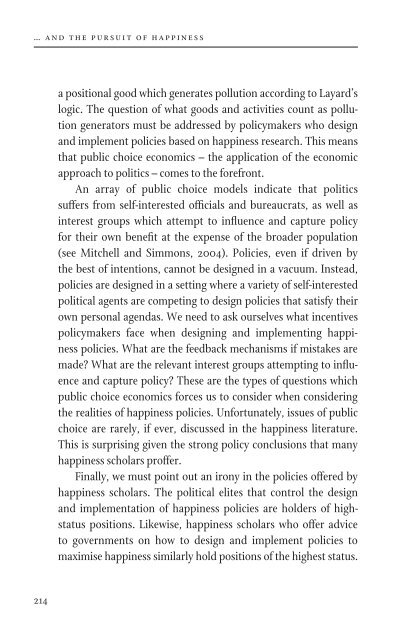… and the Pursuit of Happiness - Institute of Economic Affairs
… and the Pursuit of Happiness - Institute of Economic Affairs
… and the Pursuit of Happiness - Institute of Economic Affairs
You also want an ePaper? Increase the reach of your titles
YUMPU automatically turns print PDFs into web optimized ePapers that Google loves.
<strong>…</strong> <strong>and</strong> <strong>the</strong> pursuit <strong>of</strong> happiness<br />
lessons <strong>the</strong> from unbearable austrian lightness <strong>and</strong> public <strong>of</strong> choice happiness economics policy<br />
a positional good which generates pollution according to Layard’s<br />
logic. The question <strong>of</strong> what goods <strong>and</strong> activities count as pollution<br />
generators must be addressed by policymakers who design<br />
<strong>and</strong> implement policies based on happiness research. This means<br />
that public choice economics – <strong>the</strong> application <strong>of</strong> <strong>the</strong> economic<br />
approach to politics – comes to <strong>the</strong> forefront.<br />
An array <strong>of</strong> public choice models indicate that politics<br />
suffers from self-interested <strong>of</strong>ficials <strong>and</strong> bureaucrats, as well as<br />
interest groups which attempt to influence <strong>and</strong> capture policy<br />
for <strong>the</strong>ir own benefit at <strong>the</strong> expense <strong>of</strong> <strong>the</strong> broader population<br />
(see Mitchell <strong>and</strong> Simmons, 2004). Policies, even if driven by<br />
<strong>the</strong> best <strong>of</strong> intentions, cannot be designed in a vacuum. Instead,<br />
policies are designed in a setting where a variety <strong>of</strong> self-interested<br />
political agents are competing to design policies that satisfy <strong>the</strong>ir<br />
own personal agendas. We need to ask ourselves what incentives<br />
policymakers face when designing <strong>and</strong> implementing happiness<br />
policies. What are <strong>the</strong> feedback mechanisms if mistakes are<br />
made? What are <strong>the</strong> relevant interest groups attempting to influence<br />
<strong>and</strong> capture policy? These are <strong>the</strong> types <strong>of</strong> questions which<br />
public choice economics forces us to consider when considering<br />
<strong>the</strong> realities <strong>of</strong> happiness policies. Unfortunately, issues <strong>of</strong> public<br />
choice are rarely, if ever, discussed in <strong>the</strong> happiness literature.<br />
This is surprising given <strong>the</strong> strong policy conclusions that many<br />
happiness scholars pr<strong>of</strong>fer.<br />
Finally, we must point out an irony in <strong>the</strong> policies <strong>of</strong>fered by<br />
happiness scholars. The political elites that control <strong>the</strong> design<br />
<strong>and</strong> implementation <strong>of</strong> happiness policies are holders <strong>of</strong> highstatus<br />
positions. Likewise, happiness scholars who <strong>of</strong>fer advice<br />
to governments on how to design <strong>and</strong> implement policies to<br />
maximise happiness similarly hold positions <strong>of</strong> <strong>the</strong> highest status.<br />
The status is derived from having <strong>the</strong> influence <strong>and</strong> power to tell<br />
citizens what <strong>the</strong>y can <strong>and</strong> cannot consume, <strong>and</strong> in what amounts,<br />
in <strong>the</strong> name <strong>of</strong> maximising happiness. Surely political elites<br />
<strong>and</strong> happiness scholars, given <strong>the</strong>ir concern for <strong>the</strong> happiness<br />
<strong>of</strong> o<strong>the</strong>rs, would support a large tax on <strong>the</strong>ir own incomes <strong>and</strong><br />
consumption to reduce <strong>the</strong> significant pollution <strong>the</strong>y generate.<br />
Negative unintended consequences<br />
A major issue faced by policymakers is <strong>the</strong> knowledge problem.<br />
As F. A. Hayek (1945) emphasised, <strong>the</strong> economic problem facing<br />
society is not one <strong>of</strong> simply allocating given resources. Instead,<br />
<strong>the</strong> key issue is how to best secure <strong>and</strong> utilise <strong>the</strong> unique knowledge<br />
<strong>of</strong> ‘time <strong>and</strong> place’ that is dispersed throughout society. At<br />
any point in time an individual can possess only a small piece <strong>of</strong><br />
<strong>the</strong> knowledge that is present in society. Hayek concluded that a<br />
market economy, with an unhampered price system, was <strong>the</strong> best<br />
means <strong>of</strong> coordinating economic activities. Given Hayek’s insight,<br />
one realises that government interventions are based only on<br />
<strong>the</strong> limited knowledge <strong>of</strong> policymakers. As a result, it is unclear<br />
that specific policies can be designed that will have <strong>the</strong> desired<br />
effect because interventions will generate negative unintended<br />
consequences which policymakers, given <strong>the</strong>ir necessarily limited<br />
knowledge, could not have possibly anticipated.<br />
We noted above how a tax on a specific behaviour will reduce<br />
<strong>the</strong> amount <strong>of</strong> <strong>the</strong> taxed behaviour. Kirzner (1979) highlights <strong>the</strong><br />
‘stifled discovery process’ whereby a government intervention<br />
distorts or obscures alertness to existing or possible pr<strong>of</strong>it opportunities.<br />
By raising <strong>the</strong> cost <strong>of</strong> productive entrepreneurial activities<br />
to reduce ‘pollution’, happiness taxes also distort alertness to<br />
214 215












